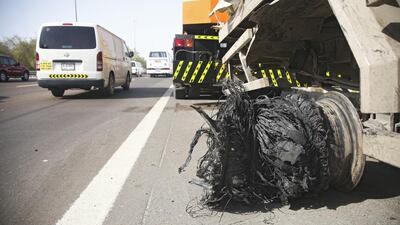ABU DHABI // The number of accidents caused by burst tyres is on the increase, according to figures from the Ministry of Interior’s traffic co-ordination department.
Nineteen accidents were caused by blown tyres during the first quarter this year, compared with 15 during the same period last year. Five people died as a result.
Faulty tyres caused 13 accidents in Abu Dhabi that killed one person and injured three others in the first two months of this year.
Abu Dhabi Police logged 7,603 offences against motorists for using defective tyres in January and February. Poor-quality tyres caused 53 accidents in 2012, killing 13 and seriously injuring 28.
Tyre incidents are often linked to used tyres or to poor-quality new tyres, which shopkeepers may try to pass off as coming from an established manufacturer, said Terry Khokhar, product marketing manager of passenger cars at Michelin Africa, India and Middle East, in April.
The tyre manufacturer recently launched thetiredigest.michelin.com that offers useful tips on tyre maintenance in an attempt to improve road safety.
Long trips, heavy loads, high speeds and higher temperatures all put additional stress on tyres, it says.
Taking care of their tyres will carry drivers and their families safely and comfortably through the hot summer months, and help to avoid costly repairs.
Motorists are advised to regularly check the state of tyres and for signs of obvious damage or abnormal wear, especially in the summer. A tread-depth gauge or wear indicators can be used to estimate usage. The minimum legal tread depth is 1.6mm for passenger car tyres.
Drivers must be aware that overloading increases tyre wear and fuel consumption, and adversely affects vehicle handling and stability.
Drivers should check tyre pressure monthly. Poorly inflated tyres wear more quickly and affect the overall performance of the vehicle, including braking distance, handling, safety and fuel consumption.
Tyres should be properly balanced by a reputable dealer to avoid uneven and premature wear of the tyres, and reduce excessive stress on the suspension components.
When driving over a large object on the road or hitting a pothole or pavement, the wheels could misalign. This can affect the handling of the vehicle, causing tyres to wear unevenly and prematurely.
In the event of a flat tyre, drivers should visit a reputable dealer who can advise if there is damage to the structure of the tyre and whether or not it can be repaired.
Drivers should monitor the suspension; old or worn shock absorbers can cause faster tyre wear and affect vehicle handling.
“In the end the tyre is the only physical contact that a vehicle has with the road surface, and therefore tyres that you are driving on should be in their most optimum condition,” said Dino Kalivas, chairman of the driver education and training committee at the International Road Federation. “It can spell the difference between having a collision and avoiding one.”
Regular public awareness campaigns and advertisements on television, newspapers, radio and billboards are necessary to reduce accidents caused by faulty tyres, said Dr Salaheddine Bendak, an associate professor at University of Sharjah who has published a scientific study on tyre safety.
“The topics should emphasise the temperature categories of tyres, their age, existence of any cracks, inside air pressure and manufacturing dates, among others,” he said.
rruiz@thenational.ae

